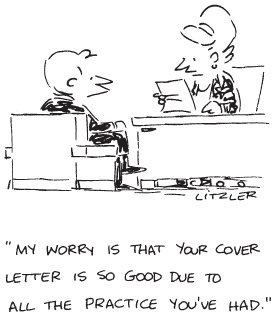Writing
Persuasive Cover Letters.
“Most cover letters are weak and do nothing to help advance the writer’s
candidacy.”
From the book Search: Winning Strategies to Get Your Next Job in the Nonprofit
World. Copyright © 2004
by Larry Slesinger. Available at
www.mynonprofitjobsearch.com/
C H A P T E R 8

Hundreds of
people send me resumes without cover letters—even when the job announcement
specifically requests one. I guess they figure I know what they want (the job
I’m filling) and assume their resumes let me know they’re capable
of doing the job. What they don’t realize is that without a cover letter,
I don’t know why they want a particular job or what makes them especially
qualified for it.
The cover letter is as important as your resume in your search for a great job
with a nonprofit. Nevertheless, it is a very different document to write well and deserves special attention. In
the end, it will take more of your time during the job-search process than your
resume.
As discussed in the previous chapter, the resume is meant to describe you, especially
what you’ve accomplished at work and what educational credentials you’ve
earned. It’s a brief document that, once written, has some permanence to
it. You don’t necessarily have to change it daily, and you can send more
or less the same document to a diverse set of potential employers. Usually it’s
written independently of any specific opening.
The cover letter is the appropriate and essential place to link yourself to
the organization you are trying to impress. Like the resume, the letter’s
purpose is not to get you the job but to get you an interview. You can’t
know whether the reader will go over the cover letter before or after the resume
(even if the letter’s on top, sometimes we look at the resume first). But
you can be sure you won’t be considered for an interview until both documents
have been read carefully.
A cover letter’s most important characteristics
Most resumes I receive do come with cover letters. But most cover letters are
weak and do nothing to help advance the writer’s candidacy. Here are the
characteristics of the best cover letters.
Tailored. Strong cover letters address the specific opening. They explain
exactly why you’re interested in it, why you’re qualified to do it,
and what you will do to follow up. A customized letter demonstrates that you
know something about the organization (maybe from research you just did on its
website) and about the position (maybe that it’s the logical
next step in your career, given the responsibilities you’ve held recently).
Almost as bad as excluding a cover letter is sending one that is clearly a form letter. When it’s obvious that you inserted the name of the organization
and position into a letter that basically talks only about you, then I can reasonably
conclude that you are also applying for five or 50 or 500 other jobs—that
what I am offering is not necessarily of great interest to you except that you
found it in a list of many other openings. This doesn’t hurt my feelings.
But it does tell me you don’t care enough to take the time to show me why
you and this particular opening are a good fit.
Literate. The cover letter is an excellent opportunity to demonstrate
your writing ability. It’s especially good for showing that you can write
persuasively, which is always a good skill regardless of the position. In contrast,
a resume is not as good for displaying your way with words. Not only is the
typical resume heavy on phrases and lists, but it’s always possible that
your resume was actually written by someone such as a career counselor (which
is OK to do).
Concise. One page is usually fine; two pages are acceptable; anything
longer is unnecessary. The following three-part structure works well:
1. Begin the letter by identifying the opening by title and organization. (Especially
when recruiters are involved, they might be filling several positions simultaneously;
don’t make us guess which one you’re interested in.)
2. Explain why the job interests you and, more important, why you offer what the employer wants. In other words, state
explicitly the “what I can do for you” angle.
3. Conclude by stating how you’ll follow up, perhaps by calling in a week
to confirm receipt.
Connected. There’s no question that personal connections help. They
don’t guarantee that you’ll get the job or even the interview. But
they help distinguish you from the many other candidates. So if you know that
I know Mary Johnson, begin your letter by saying, “Mary Johnson suggested
I contact you because she thought my skills and experience would be a good match
for the chief operating officer position you’re filling at Organization
X.” This significantly increases your chances that I will seriously consider
interviewing you. But if you don’t have a connection, don’t fret.
You’ll still get considered if you have a strong cover letter and resume.
The best cover letter is the one that makes me say to myself, “I want to
meet this person—pronto.”
The complete chapter in Search includes
annotated examples of an effective cover letter and one that fails.
The book SEARCH: Winning Strategies to Get Your Next Job in the Nonprofit
World is available at
www.MyNonprofitJobSearch.com.
